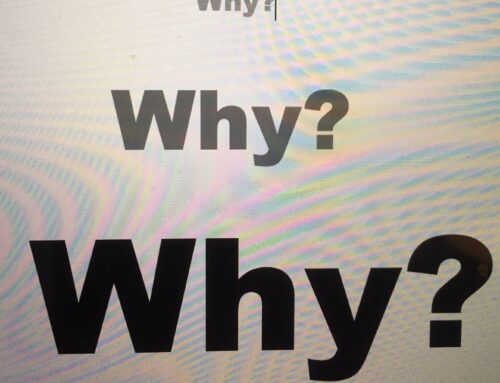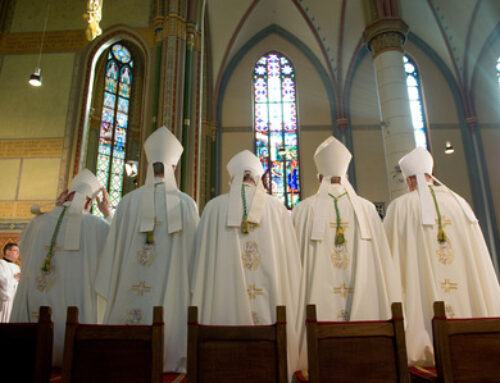
Criticizing a document focused on moral theology is risky because the critic can all too easily be dismissed as irreligious, unenlightened, or both. Yet when the moral theology is flawed, as it is in this case, the risk is well worth taking. Although the USCCB document is in some places lofty and insightful, in others it is shallow and misguided.
No thoughtful person will deny the relevance of Christ’s teachings to the plight of immigrants—specifically, His direction to feed the hungry, clothe the naked, welcome the stranger, and care for the oppressed. It is therefore reasonable for the bishops to have chosen this focus and to turn to the works of Popes Pius XII, John Paul II, and Francis for guidance.
What is curious, however, is that the document makes no mention of Pope Leo XIII’s 1891 encyclical Rerum Novarum. The omission is especially unfortunate because that famous work articulates a mature moral perspective that modern bishops, and anyone else concerned with contemporary social problems, could profit from studying.
The key to developing such a perspective is to distinguish between merely quoting scriptural passages or citing ethical ideals (virtues) and analyzing issues in light of them. The latter process entails identifying all the moral obligations, especially conflicting ones, and examining the choices of action and their likely consequences. In this process the bishops have been deficient. To adapt a line from G.K. Chesterton, they have stated the easy part, ignored the hard part, and gone home to their tea (or more bracing beverages). The following examples are among the most important. (The boldface type is my addition.)
The USCCB document defines the illegal immigration problem exactly as the Obama administration does—as a “humanitarian crisis” requiring US government cooperation and funding, specifically for “child welfare services, legal assistance, and access to immigration protection.” Although it speaks of finding “root causes” in the countries of origin and discusses what the countries themselves and “other regional partners” can do to solve the underlying problems, the emphasis is on the US role in these matters. For example, the document makes this recommendation: “The United States should strengthen protections for children from Central America. Unaccompanied minors who arrive in the United States possess legal rights which should be honored.” (Do the authors mean this stipulation to apply universally, even in cases where the “arrival” violates the laws of the country or the rights of the people in whose country the arrival occurred? The document does not address these questions.)
The issue, of course, can be defined differently—as a “border crisis that has raised humanitarian concerns,” but the document disparages that definition and, by implication, the US citizens who hold it. It declares: “The US and its regional partners must avoid the simplistic approach of addressing the forced migration by forcing children back through increased border enforcement. This response is akin to sending these children back into a burning building they just fled. Instead the approach must prioritize protection for those who are displaced from their homes, especially children, the most vulnerable.” (This is hardly a responsible consideration of consequences. The bishops ignore the likely effects of failing to enforce the border—encouraging the countries of origin to continue neglecting their social problems, rewarding the lawless “coyotes” for violating US laws, and most important, subjecting the children to deprivation and physical/sexual abuse during their journey and hardship thereafter.)
The USCCB document devotes considerable space to Catholic social teaching, stressing the idea that all people are created in the image and likeness of God and therefore possess an inherent dignity and fundamental human rights. Citing John Paul II, it claims that illegal as well as legal immigrants possess these rights and the illegals’ rights should be balanced against “the rights of nations to control their borders.” Note that the quoted phrasing compares people’s rights with nation’s rights. Is this a fair comparison? Should it not be the rights of certain people (immigrants) versus the rights of other people (citizens)? More about this when I discuss Rerum Novarum.
Perhaps the most revealing characteristic of the USCCB document is that it speaks almost exclusively about the response of governments and the Catholic Church to the “humanitarian crisis,” but says virtually nothing about the response of American citizens, taxpayers, or even Catholic parishioners. For example, it declares that “the institutional Catholic Church in the United States has played a critical role in the care of unaccompanied children.” That wording is highly misleading. In reality, everything the “institutional Catholic Church” does is financed by citizen’s taxes (awarded in the form of federal grants), by the generosity of Catholic parishioners, or by both. The focus on institutional efforts is therefore an insult to the millions of Americans who actually fund the works of charity and mercy. It is also, in effect if not intent, a subtle denial that legal US residents also possess God-given dignity and rights.
I noted earlier that the USCCB document cites the writings of several popes but ignores Pope Leo XIII’s Rerum Novarum. A brief sampling of Leo’s points will reveal the significance of that omission. (As above, I have used boldface type to highlight important words.)
[Socialists] hold that by . . . transferring property from private individuals to the community, the present mischievous state of things will be set to rights [sic], inasmuch as each citizen will then get his fair share of whatever there is to enjoy . . . [This transfer is] emphatically unjust, for [it] would rob the lawful possessor, distort the functions of the State, and create utter confusion in the community . . . Every man has by nature the right to possess property as his own.
The first and most fundamental principle, therefore, if one would undertake to alleviate the condition of the masses, must be the inviolability of private property.
[Although sharing one’s wealth and other temporal blessings is a requirement of Divine Law], it is a duty, not of justice (save in extreme cases), but of Christian charity—a duty not enforced by human law.
Among the many and grave duties of rulers who would do their best for the people, the first and chief is to act with strict justice . . . toward each and every class alike.
Neither justice nor the common good allows any individual to seize upon that which belongs to another . . . The State would therefore be unjust and cruel if under the name of taxation it were to deprive the private owner of more than is fair.
By omitting any reference to Rerum Novarum, the USCCB document conveniently ignores a theological argument that challenges the bishops’ argument.
If we apply Leo’s ideas to the present US immigration crisis, we will conclude that citizens of the United States are also children of God with fundamental rights that should not be abridged, especially not by the State. Those rights include secure borders and protection from unfair taxation to provide entitlements to illegal aliens. Moreover, again following Leo, we will conclude that, though we all have a debt to our less fortunate neighbors, it is a debt in charity rather than justice, and we are answerable to God, rather than to the government, for its fulfillment.
Even if the US bishops lean toward the thinking of Gustavo Gutiérrez, they are surely familiar with Leo XIII’s landmark encyclical, and they should therefore understand its relevance to the present discussion of illegal immigration. When they dismiss a line of thought consistent with Pope Leo’s insights as a “simplistic approach,” they do Pope Leo, their fellow Catholics, and the Catholic theological tradition a grave disservice. And when they pretend that only their perspective is compatible with Christ’s exhortation to care for those in need, they deepen the offense. US Catholics and their fellow Catholics around the world deserve better from those charged with spiritual leadership.
Copyright © 2014 by Vincent Ryan Ruggiero. All rights reserved



